Jealousy is as natural a human emotion as any but one that has earned a bad rep because it can easily spiral out of control and take a toxic form. When that happens, it can prove detrimental to even the strongest, most passionate relationships, obliterating the good and replacing it with an awful, all-consuming sense of negativity. The toxic jealousy signs may not become apparent right at the onset, but slowly and surely, it will reduce your bond into a hollow shell of a relationship.
Besides, being in a relationship riddled with jealousy can also adversely impact your mental health, emotional well-being, and self-esteem. If you’re dealing with a jealous partner, it’s time to recognize their unhealthy relationship behaviors for what they’re and stop passing them off as expressions of love or gaslighting yourself into excusing their behavior by asking questions like, is jealousy a sign of love?
If you want your relationship to work, jealousy needs to be dealt with and rooted out at a fundamental level. However, given that we all tend to get envious, jealous, or even possessive about our significant others at some point, the process must begin with recognizing toxic jealousy signs.
Healthy Jealousy Vs Unhealthy Jealousy
Table of Contents
Much like happiness, anger, and fear, jealousy is an inherently human emotion. So, technically, it is quite normal for people to feel jealous. A partner who really cares about you and loves you might go a little green with envy if they notice you getting or paying attention to someone else or prioritize work, social life, or even ‘me’ time over them. Childish as it may seem, it’s understandable and normal.
However, if your partner starts controlling your every move, suspects you, or falsely accuses you of cheating or deception, becomes over-possessive, and leaves you feeling stifled, then they’re displaying toxic traits stemming from unhealthy jealousy. To understand this better, let’s take a closer look at healthy jealousy vs unhealthy jealousy difference:

Jealousy is normal
We all get a little jealous sometimes. For example, if your friend gets a really great job when you are still on the lookout for one, you may feel a knot in the stomach. That does not mean you’re not happy for them. That also does not mean that you are a bad person. Jealousy is normal; it makes us human. It makes us want to possess our favorite things and people and never share them.
Where there is love, there will almost always be envy and a desire to keep the loved one all to oneself. What makes that normal emotion turn toxic and problematic is when you decide to actually act on it. So, while wanting to not share your partner’s attention is understandable, it is unhealthy to actually try to keep them from meeting with and interacting with other people.
Related Reading: How I Turned Into A Jealous Monster
So, when is jealousy unhealthy?
The healthy jealousy vs unhealthy jealousy difference is that the unhealthy and toxic kind usually stems from insecurity and possessiveness. It can lead people to try to control what their partner wears, where they go, who they meet with, etc. And that is never okay. No matter how much two people love one another, they are allowed to have their own, separate lives.
While shared activities are great, you don’t have to do everything together. The occasional boys’ or girls’ night out does not mean that love between a couple has faded. In fact, it is actually healthy for partners to spend time alone and with other friends.
But some partners will still try to go everywhere and do everything with you. They will throw tantrums when someone who makes them jealous likes your latest Insta post. They will ask you why the girl in your class texted you to ask for help with the assignment and not anyone else. They will try to get you to stop wearing clothes they think are too revealing. And so on.
So, while jealousy – when in moderation – is normal, even healthy, the kind of jealousy that makes you want to control your partner is not. Such toxic jealousy signs can cause trust issues, drive partners apart, leave emotional wounds, and, in the end, destroy the relationship completely.
Related Reading: 15 Strategies To Stop Being Jealous And Controlling In Relationships
11 Toxic Jealousy Signs You Must Not Ignore
There is no denying that being overly jealous is toxic. As we’ve already established, while some amount of jealousy is inevitable, when it gets out of control, it can leave you grappling with a toxic relationship. The good news is that it is not a situation you’re doomed to put up with, with walking out being the only alternative.
It is possible to find a solution to these unhealthy relationship behaviors, as long as both the partners are willing to do the work of identifying and weeding out the reasons for jealousy in relationships. More often than not, you have to look for the behavioral signs to ascertain what causes jealousy. Here are 11 signs of a jealous partner that can be unhealthy for your relationship:
1. Suspicion without evidence
If your partner doubts your commitment and loyalty to them and levels false accusations without any evidence or reason, it’s one of the foremost toxic jealousy signs warning you there’s trouble in paradise. Renowned psychologist and relationship expert Dr. John Gottman says, “Baseless accusations, especially when made repetitively, are a form of emotional abuse that undermines trust and respect. The jealous partner often projects their own insecurities onto the relationship.”
Related Reading: Here’s How Being Clingy In A Relationship Can Sabotage It
2. Clingy behavior and seek reassurances
Jealousy in a relationship is most often an indication of insecurity. This can also manifest in obsessive behavior and a constant need for reassurance. “If your partner constantly seeks reassurance from you, it indicates a fear that they’re not good enough for you, which is often tied to low self-esteem. While it’s normal to seek validation occasionally, when it becomes a frequent demand, it can weigh down the relationship,” explains Dr. Terri Orbuch, a relationship expert. This may result in your partner,
- Wanting to spend all their time with you
- Asking you if you love them several times in a day
- Picking a fight or getting in a mood if these needs are not met
3. Constant surveillance

If being with your partner transports you to those childhood days when you had to report your whereabouts to your parents at all times, you’re dealing with one of the most obvious jealous partner signs. This may translate into your partner,
- Keeping tabs on your every move
- Checking your phone
- Confirming your whereabouts from others
- Tracking your social media activity
Explaining why this is one of the most toxic traits stemming from jealousy, clinical psychologist Dr. Lisa Firestone says, “When jealousy manifests as the need to monitor your partner’s every move, it signals a lack of trust. This behavior can quickly turn into obsessive control, which is a hallmark of toxic relationships.”
Related Reading: Recognizing The 13 Red Flags Of A Controlling Relationship
4. Trying to control your time and attention
Exercising control and limiting a person’s independence and agency is among the most unhealthy relationship behaviors. That’s what you may find yourself dealing with if your partner grapples with toxic jealousy. They may try to control who you meet with, where you go, and how you spend your time.
Even if they don’t actively stop you from doing your own thing, they certainly don’t appreciate it. This becomes evident when your jealous partner resorts to guilt-tripping, shaming, or stonewalling you every time you do something they don’t want you to. This is a very primitive way of looking at human connections and can make you feel ashamed for just wanting to do things on your own.
“Toxic jealousy often involves one partner demanding all of the other’s time and energy, leaving little room for individuality or personal space. It creates an unhealthy dynamic where the jealous partner feels entitled to control the other’s life.”
— Dr. Joshua Klapow, clinical psychologist
5. Exhibiting stalker tendencies
Extreme jealousy in a relationship can make a person paranoid and they may end up exhibiting toxic traits that can be harmful to both them and their partner. One classic example of this is that your partner starts stalking you because they cannot bring themselves to believe that you’re doing what you say you are. Now stalking doesn’t necessarily mean that they follow you discreetly wherever you go. It can also look like this:
- Showing up at your workplace unannounced, repeatedly
- Insisting on driving you to wherever it is that you’re going
- Stopping by to say hello if you’re out with your friends.
These stalker tendencies are among the clear toxic jealousy signs. Don’t mistake them for signs of true love. If you still want your relationship with this person to work out, you have to take corrective measures now.
Related Reading: 10 Tips To Turn Jealousy Into Motivation
6. Isolating you from loved ones
Where there is jealousy, signs of an unhealthy relationship begin to emerge. One such classic sign that you cannot—and shouldn’t—overlook or ignore is your partner’s attempt to isolate you from your loved ones. Now, this often happens so gradually, that most people fail to notice a very intentional, sinister plan at play. Slowly but surely, your partner may be trying to cut you off from friends and family who mean the world to you by,
- Badmouthing the people you socialize with
- Not giving you space to engage with them freely
- Controlling your communication with them
- Making you feel bad about wanting to spend time with them
“A jealous partner may attempt to isolate you from friends or family as a way to gain control. This form of isolation is a red flag for emotional manipulation and can severely impact mental well-being,” says psychotherapist Dr. Beverly Engel.
7. Disproportionate reactions to situations

Jealousy in a relationship is most often an indication of insecurity and low self-esteem. These feelings of inadequacy may make your partner react disproportionately to even the most innocuous and routine situations. For instance, if you’re out on a work trip, they’re consumed by the fear that you’re sleeping around. Or if you tell them you have plans with friends, they immediately think you’re cheating on them. This can leave you walking on eggshells around your partner.
Relationship therapist Dr. Jenn Mann explains, “Toxic jealousy can create disproportionate reactions to innocent interactions, like casually talking to a coworker. These overreactions are usually rooted in deep insecurity and fear of abandonment.”
8. Extreme insecurity
Insecurity is not only the cause of extreme jealousy in a relationship but can also be one of its most telling signs. In a toxic relationship riddled with unhealthy jealousy, your partner may feel insecure about anyone or anything that takes away your focus from them. This can be,
- Your work
- Your parents
- Your friends
- A pet
- A hobby
Celebrated author and clinical psychologist Dr. Seth Meyers says, “Toxic jealousy often stems from a deep sense of insecurity where one partner feels threatened by anyone or anything that diverts attention from them. This insecurity can lead to controlling or paranoid behaviors.”
9. You don’t feel respected
One of the signs of an unhealthy relationship, marred by the green-eyed monster of jealousy, is that you don’t feel respected. When your partner wants to control every aspect of your life, judges your choices, and doubts your every move, it is hard to believe that they respect who you are as an individual. That realization can be immensely stifling. Over time, it can damage your self-esteem and sense of self.
If the unhealthy relationship behaviors of your jealous partner have started impacting you on this level, it is time to have an honest conversation with them. Reclaim your autonomy and let them know that they must get their act together if they want the relationship to work out. Of course, if your partner wants to make an earnest effort to change, reassure them of your support.
10. Using guilt to control you
One of the most telling toxic jealousy signs is guilt-tripping in a relationship. From shaming you for not prioritizing them to making snide remarks or playing the victim card, your partner may use a whole buffet of manipulative tactics to make you feel bad for doing something. The end goal here is to use guilt and shame as tools to control your behavior and actions.
“A jealous partner may use guilt to manipulate you into conforming to their desires. This emotional blackmail traps the other person into feeling responsible for their partner’s insecurities, which is a classic sign of toxic jealousy.”
– Dr. Sherry Gaba, psychotherapist
11. Emotional manipulation
Psychologist Dr. Harriet Lerner says, “Jealousy often masks deeper issues of control and manipulation. A jealous partner might play on your emotions, making you feel responsible for their unhappiness, which is a major warning sign of emotional abuse.” Your partner is exhibiting toxic jealousy signs if they try to manipulate you emotionally by:
- Withholding affection
- Resorting to the silent treatment
- Gaslighting
- Bringing in a third person to make you feel insecure
- Making subtle or outright threats
How To Deal With Jealousy In A Relationship—5 Tips
Such toxic jealousy should have no place in a healthy relationship. If you find yourself dealing with a jealous partner, it is important to acknowledge the problem instead of passing it off as a sign of how much they love you. Or masking the red flags with questions like, is jealousy a sign of love?
From here, you can either help your partner get over their jealous tendencies or walk out. There is no third alternative. However, know that the first option can only work if your partner recognizes the problem and is willing to do their bit to correct it. If you’re confident that they’d be willing to work on themselves and save the relationship, the following expert-back tips on how to deal with jealousy can help:
Related Reading: How Jealousy Killed The Love Which No Conspiracy Or Distance Could
1. Offer reassurance but avoid overcompensating
When your partner displays toxic jealousy signs, it may seem like offering reassurance and giving them extra attention will only enable their unhealthy behavior. However, it’s important to remember that jealousy in a relationship is most often an indication of insecurity and extreme vulnerability. So, even if you do not quite understand why they are so anxious and insecure, try and support them through it.
- Spend extra time with them
- Touch them more
- Remind them how much you love them
At the same time, don’t overcompensate. While showing affection can help your partner face their fears, remember not to coddle them or enable them. Be affectionate but don’t spoil them. Unhealthy jealousy is not okay and they should not be made to feel otherwise or it will only lead them to try to control you more. “While it’s essential to reassure your partner, be careful not to overcompensate for their jealousy. Over-accommodating their fears may reinforce the behavior rather than help them confront and manage it,” advises Dr. Orbuch.
2. Talk about their anxieties

If you think your partner has been especially anxious and insecure about you and your relationship of late and is showing some signs of unhealthy jealousy, it is time to sit down and have a heart-to-heart. Ask them what’s up.
- What is making them feel this way?
- Have any of your actions or behaviors been triggering these insecurities?
- Does it stem from a past relationship?
- Does their jealousy get triggered by a particular person or is it a more general sort?
Don’t try to counter them. Don’t argue or try to fix whatever it is. Listen instead. “It’s important to create a safe space where your partner feels comfortable discussing their jealousy without judgment. Open communication can help uncover underlying insecurities and foster mutual understanding,” says Dr. Gottman.
Related Reading: “My Anxiety Is Ruining My Relationship”: 6 Ways It Does And 5 Ways To Manage It
3. Try to understand without getting defensive
Try to understand what they are saying and what’s making them feel this way. It may be hard not to get angry, especially if they point out something that really wasn’t your fault. But, instead of getting defensive and yelling and getting sucked into the same fight again, listen to what they have to say, and then, try to explain your side to them.
Do not lose your cool while doing this. If your partner is a reasonable person, they should see your side too soon enough and realize that the fears are, in fact, baseless. On the other hand, if they keep trying to accuse you and refuse to believe whatever you say, it may just be time to reevaluate the entire relationship.

4. Help them build their self-esteem
As we’ve already discussed, jealousy stems from insecurities and low self-esteem. “Often, jealousy stems from deep insecurities. Encouraging your partner to engage in self-improvement and focus on their personal strengths can help them feel more secure, reducing the tendency toward jealousy,” says Dr. Meyers.
So, the best resource on how to deal with jealousy might just be to address these underlying issues. Encourage your partner to work on themselves, and if necessary, seek professional help to address these issues that are manifesting as signs of jealousy in relationships.

5. Set healthy boundaries
While it is important to be supportive of your partner throughout this journey, it is also important to set some boundaries for them and yourself. Tell them what is not okay. Calmy call them out when they are showing signs of unhealthy jealousy. Neither of you can tell the other person what they can wear, where they can, and who they can hang out with.
“Setting boundaries is crucial when dealing with a jealous partner. These boundaries help ensure that the relationship remains respectful and healthy, preventing controlling or possessive behavior from escalating,” advises Dr. Mann.
Related Reading: Healthy vs. Unhealthy Relationships – 10 Characteristics
FAQs
1. How do guys act when they are jealous?
When jealous, a guy may try to keep you from talking to other guys and try to restrict where you go and what you wear. In extreme cases, they may even make you stop talking to your guy friends completely, making you delete them from your social media and blocking them on your phone. These are some unhealthy signs of jealousy in relationships.
2. What is toxic jealousy?
Toxic jealousy is when a person tries to control their partner’s life and what they do and where they go because you are constantly insecure about them. If a person forces their partner to constantly be by their side, at the cost of losing friends and causing career damage, you are showing the classic toxic jealousy signs.
3. Is it okay to be a jealous boyfriend?
Jealousy is okay as long as it is fleeting and manageable. As we’ve been saying, it is normal and human to feel jealous. But what is not okay is to let jealousy dictate one’s actions, turning one into a constantly suspicious, over-possessive, controlling, and jealous boyfriend.
Key Pointers
- Jealousy is a natural human emotion but it can easily spiral out of control and take a toxic form
- Toxic jealousy stems from insecurity and possessiveness
- Toxic jealousy is characterized by baseless suspicions, clingy behavior, constant surveillance, control, isolation, and emotional manipulation
- While damaging when left unattended, toxic jealousy can be dealt with effectively by offering assurances, giving your partner a safe space to talk about their anxieties, helping them heal, and setting healthy boundaries
Final Thoughts
Jealousy in a partner is not always easy to deal with. But, as long as your partner hasn’t completely veered into dangerously toxic and even violent territories, proper communication and effort can help you both emerge from the ordeal as more grounded and secure people. In fact, since you chose to empathize and support them in times of vulnerability, you may find that they are trusting you more, bringing you closer than ever before.
Pride And Jealousy Have No Place In A Relationship, Proved Lord Krishna
Jealous Girlfriend: 15 Signs She Is Being Overprotective And Driving You Nuts
Your contribution does not constitute a charitable donation. It will allow Bonobology to continue bringing you new and up-to-date information in our pursuit of helping anyone in the world to learn how to do anything.

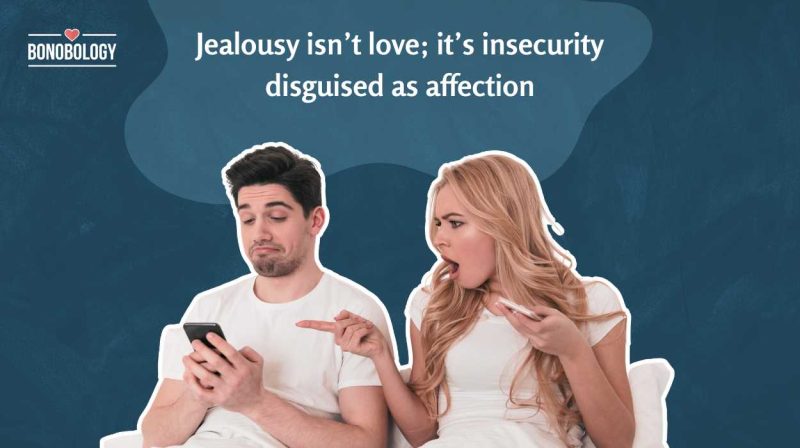
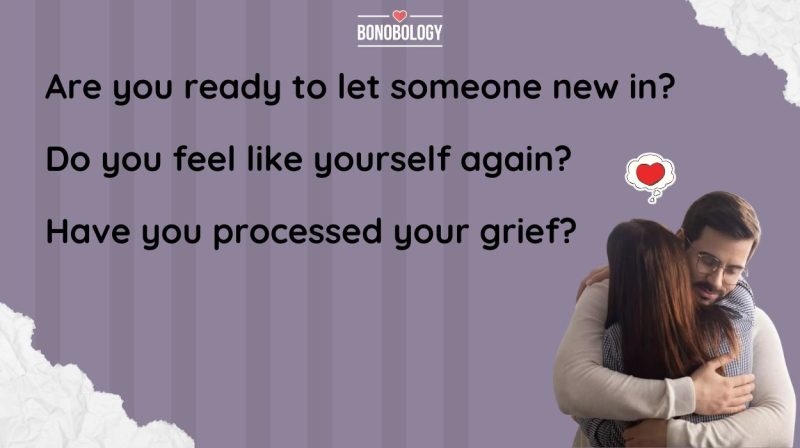
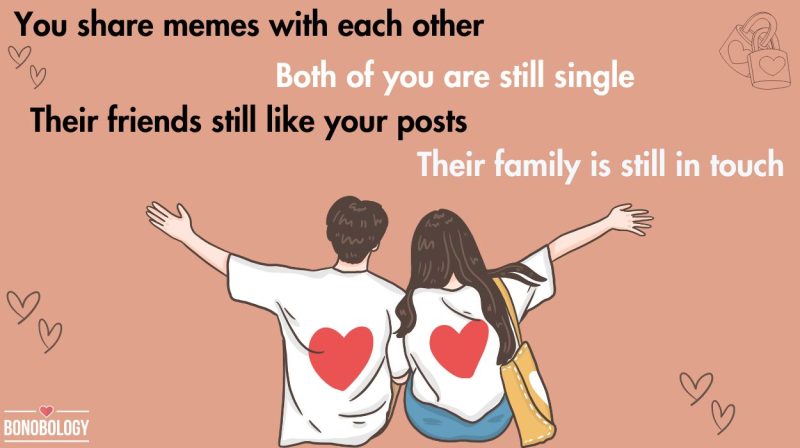














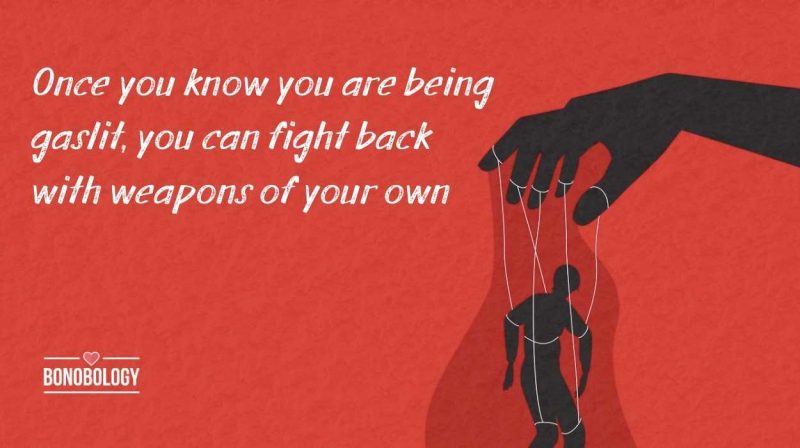
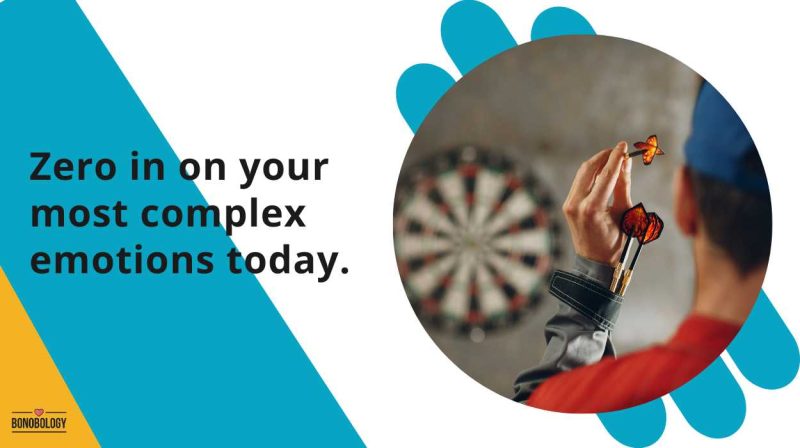


Featured
Am I Moving On Too Quickly After Death Of Spouse—How To Decide
15 Signs You’ll Get Back Together With Your Ex
How To Get Over Trust Issues — A Therapist Shares 9 Tips
Learn How To Forgive Yourself For Hurting Someone You Love
How To Find Peace After Being Cheated On — 9 Tips From A Therapist
How To Forgive A Cheating Husband: 15 Helpful Tips
35 Disturbing Signs Of Gaslighting In A Relationship
What Is Narcissistic Ghosting And How To Respond To It
‘My Husband Starts Fights And Then Blames Me’: Ways To Cope
How To Rebuild Your Life After The Death Of A Spouse: 11 Expert-Backed Tips
My Husband Died And I Want Him Back: Coping With Grief
“Am I Unlovable” – 9 Reasons You Feel This Way
11 Signs Your Girlfriend Was Sexually Abused In The Past And How To Help Her
Coping With Breakups: The Must-Have Breakup Apps For Your Phone
15 Signs You Are Wasting Your Time Trying To Get Your Ex Back
Why Are You Obsessed With Someone You Barely Know — 10 Possible Reasons
33 Phrases To Shut Down Gaslighting And Silence Gaslighters
The Emotion Wheel: What It Is And How To Use It To Build Better Relationships
The Role Of Supportive Relationships In Addiction Recovery
7 Signs You Have A Verbally Abusive Wife And 6 Things You Can Do About It